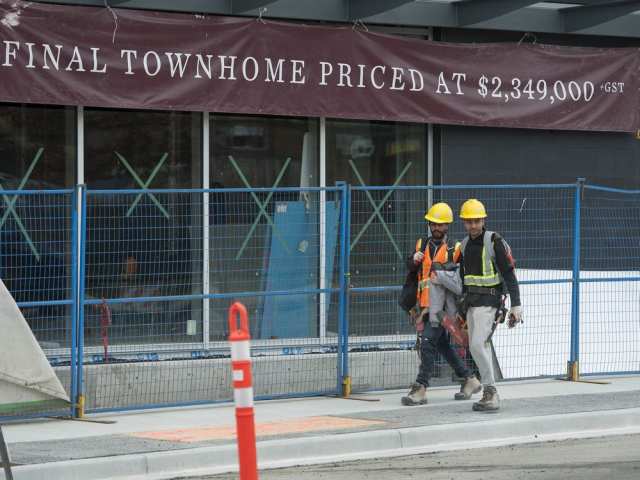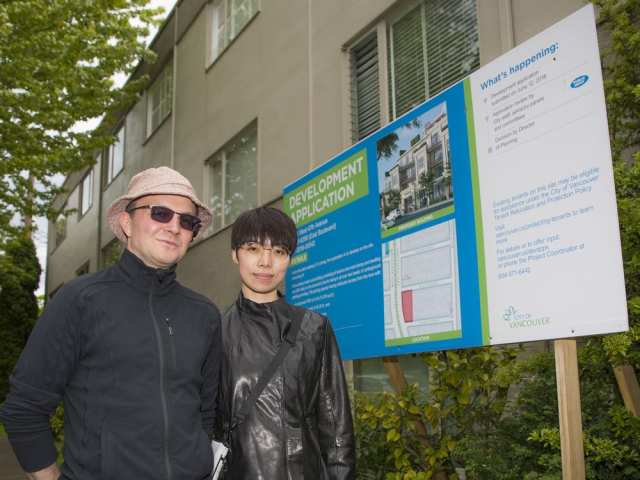Metro renters pummelled by demovictions and gentrification
We’re told rental is the future
Douglas Todd
The Vancouver Sun

Semi-retired UBC geographer David Ley in Kerrisdale, where purpose-built rental units, small stores and co-ops in his neighbourhood are being demolished to build expensive condominiums. Jason Payne / PNG


Construction workers walk by a building under construction on West Boulevard. Many purpose-built rental units in the Kerrisdale neighbourhood are being demolished in order to build expensive condominiums. Jason Payne / PNG

Morgan and Jeany Kroon are facing possible demoviction in the 6300 block of East Boulevard in Vancouver. Francis Georgian / PNG
A few years ago, one of the daughters of University of B.C. geographer David Ley, with her husband and child, rented a one-bedroom apartment along the Kerrisdale section of the Arbutus Greenway.
The suite was large by the increasingly shrinking standards of Vancouver. And the rent was reasonable, at $1,100 a month. But now the modest, pleasant-looking purpose-built apartment building on the Arbutus Greenway is under threat. So are hundreds of similar units in rental, co-op and older condo buildings along this corridor.
Change is coming. Developers are moving in, tearing down 1960s, wood-frame walk-up buildings. They’re often replacing them with flashy multi-million-dollar luxury condos. City of Vancouver development-application permit signs are popping up like oversized weeds, suggesting more gentrification will come, ousting renters and others who are in decent housing arrangements.
While Ley’s daughter and family have moved, the veteran urban development specialist worries hundreds of tenants in relatively affordable, relatively roomy accommodation in the four-storey apartment blocks along this strip of Arbutus Greenway will soon be displaced and have few low-cost places to go.
“The problem in Metro Vancouver is that affordable rental is being replaced by expensive condos. It’s the history of gentrification,” Ley said during a recent tour of the stretch of low-rise buildings along East and West Boulevards between 41st and 49th Avenues, an area that is rife with construction and blanked-out windows.
Ley, who has lived in Kerrisdale for decades, appreciates the newly opened Arbutus Greenway, which is bringing in a fresh stream of pedestrians and cyclists. The Greenway is soon to be further adorned with elaborate landscaping, gardens, washrooms and other amenities.
But the Arbutus Greenway also illustrates how taxpayer-funded improvements can gentrify neighbourhoods, Ley said. New amenities draw high-end real-estate developers, who tear down affordable retail outlets and rental and co-op housing and typically erect costlier condos with the aid of artsy marketing slogans.
“This is happening all over the city,” Ley said.
Although the process of gentrification is “really concentrated and happening quickly” in this stretch of fairly pricey Kerrisdale, it has for years also been hitting low-cost rental units elsewhere — especially in Burnaby and Coquitlam.
Here’s a sign of the times: A luxury condo complex facing the Arbutus Greenway in Kerrisdale, at 47th and West Boulevard, has replaced an affordable equity co-operative building. The new 40-unit condo complex, called The McKinnon, recently posted a sign marketing what it said was its last unit.
Asking price: $2.349 million.
Kerrisdale renters Morgan and Jeany Kroon reacted in stark amazement at the condo price tags advertised just across from them on the Arbutus Greenway.
“It seems crazy. Who’s going to be able to pay that?” said Morgan. He and his wife, who both have jobs, rent a 500-square-foot apartment on East Boulevard for $1,300 a month.
They’ve been renting for two years in their wood-frame building, which, along with three others adjacent to it, are now fronted with development application signs. One sign promises a stylish new 45-unit complex.
Many of the units in the buildings on this block were vacant before the city of Vancouver brought in its empty homes tax. But two years ago, Jeany discovered on a Chinese-language website that the developer was renting them.
Earlier this year, the Kroons thought they were going to be forced to move, along with other renters. But in the fast-changing real-estate market, where prices are now falling, the owners recently told the Kroons they could stay and rent for one more year.
Who knows what might happen next for the Kroons and the tenants in similar situations? They know the condos popping up along the Arbutus Greenway, which generally range between $1 million and $2 million, are not an option for them.
‘We’re told rental is the future’
Such uncertainty goes on across Metro Vancouver, which continues to have some of the most expensive housing in the world, even if prices might have peaked last year. Grand condo complexes, both towers and low-rises, are being erected across the region, often marketed to offshore investors.
The ratio of median housing prices to median wages in Metro Vancouver is a crushing 12 to one. Toronto is eight to one; Seattle is five to one. Four to one is considered “affordable.”
Given the chasm between local wages and housing prices, many politicians and others have said residents will have to get used to renting — if they want to live and work in a city that happens to have become highly attractive to the global rich.
“We’re told rental is the future,” Ley said, as he points to another series of 1960s-built residential buildings on East Boulevard that are in a state of flux. “But you wonder how long this block will last. It’s like dominoes falling.”
This eight-block Kerrisdale corridor on the west side of Vancouver — where luxury condo complexes have already been completed, are under construction or are in the planning stages — is full bore into a transition that has already led to the evictions of thousands of renters in other parts of the city.
Craig Jones is a University of B.C. geography PhD candidate who also teaches community data science at SFU’s City Program. He said more than 2,000 apartment units, most of them rentals, have been demolished since 2008 in the city of Vancouver; with almost 1,300 of those demolitions happening in 2017 and 2018.
The same thing has been happening at arguably a greater pace in Burnaby, especially in the large hub of low-rise rental buildings that once surrounded Metrotown.
Longtime Burnaby mayor Derek Corrigan was turfed in the fall election because he was seen as doing little to stop hundreds of affordable old rental units being torn down and replaced with costly condos, especially in towers, many of which were pre-sold in Asia.
Almost 1,000 rental units have been demolished in Burnaby since 2012, mostly in the Metrotown region, Jones said. And another 300 units are set to be torn down in the city in the next year or two.
“We’re talking about displacement of some of the most disadvantaged people.”
© 2019 Postmedia Network Inc.